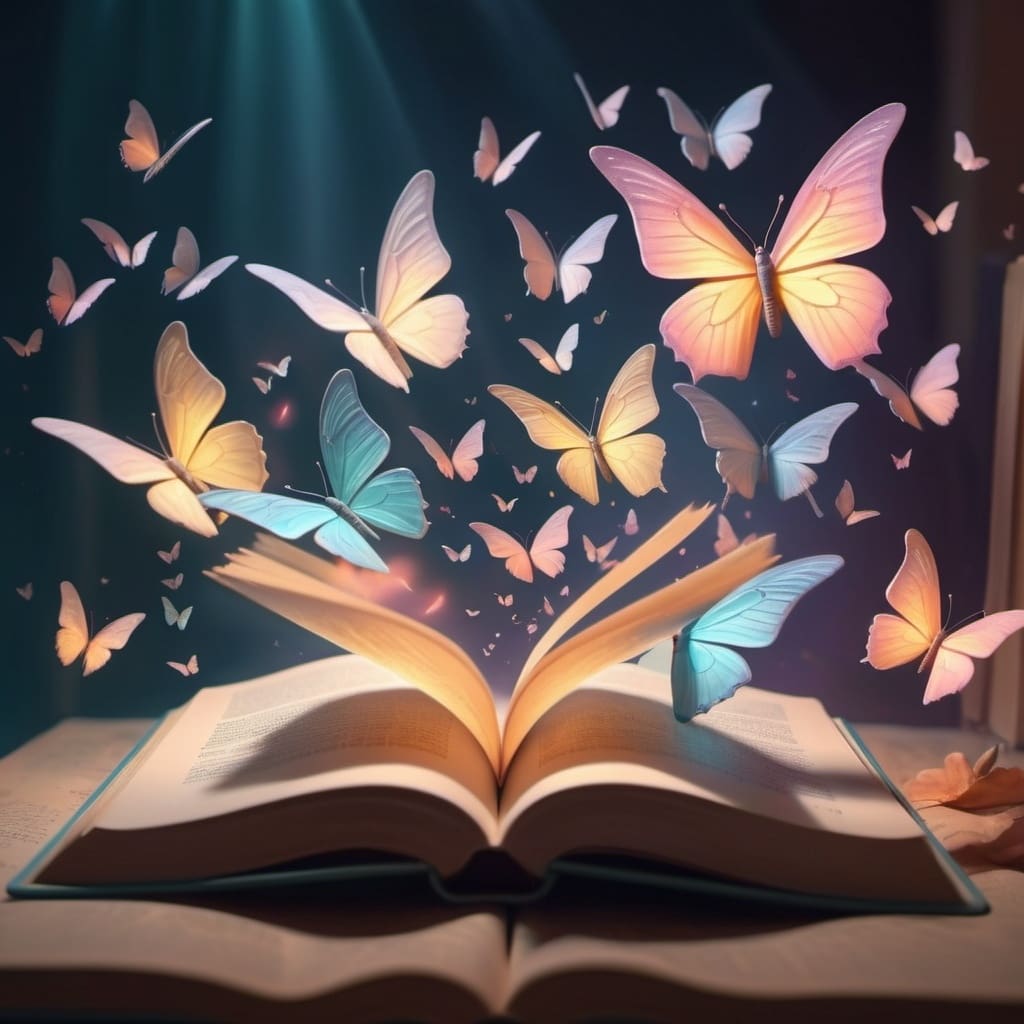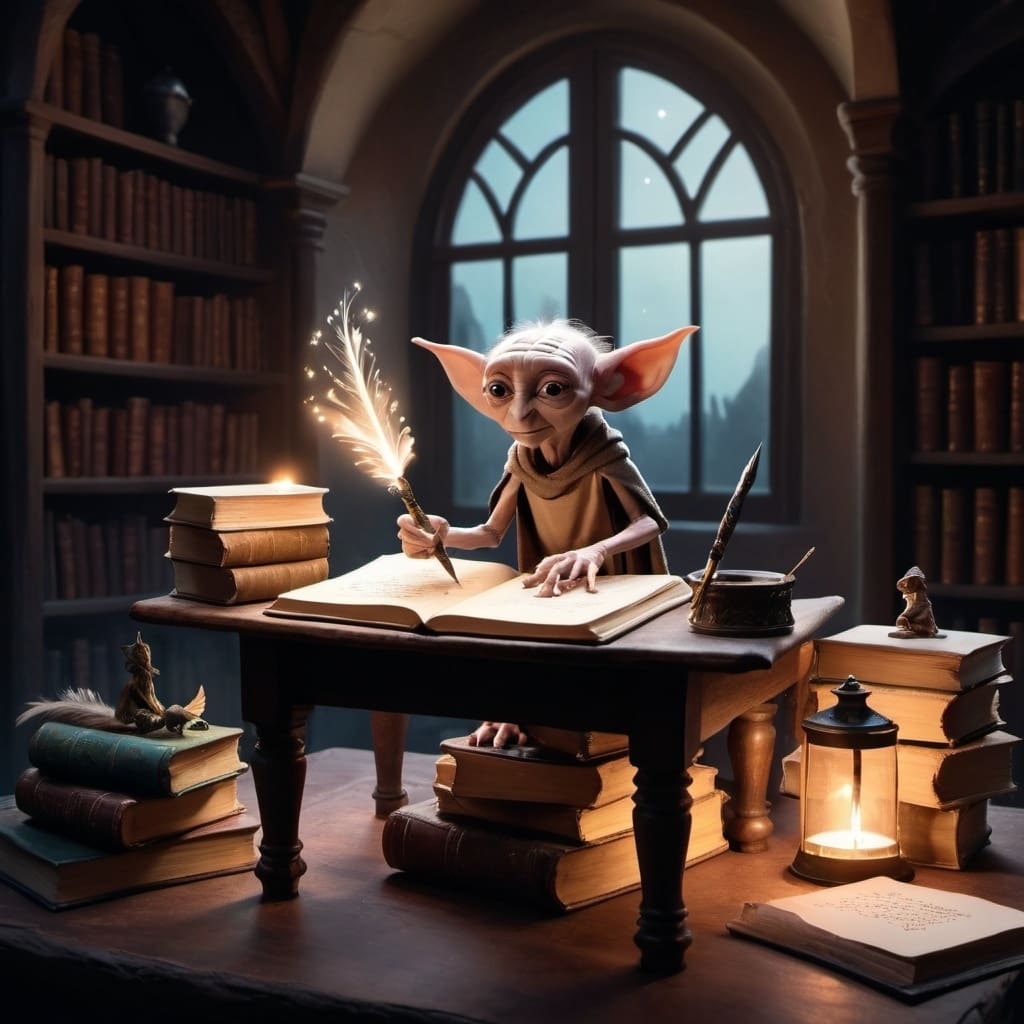Embracing Your Inner Dobby: How Growth Mindset Makes You a Master of Words, Not a House Elf
Imagine you’re Dobby, the beloved house-elf from J.K. Rowling‘s magical world of Harry Potter. Dobby’s unwavering determination to rise above his circumstances is a reason to celebrate, even though he is small and often overlooked.
Now picture yourself as a writer or student improving your skills and mindset—feeling like a metaphorical ‘house-elf’ in the vast universe of wordsmiths.
It’s a lot to take in, don’t you think? But here’s the kicker; just like Dobby didn’t let being an elf define him (he became one heck of a free spirit), we, too, shouldn’t let initial struggles deter us from achieving greatness.
Let me introduce you to Growth Mindset 101: The idea behind it is simple yet profound—intelligence and abilities aren’t fixed traits; they can be developed over time through hard work, strategies, resilience against setbacks…and yes, even sheer stubbornness!
Harnessing a growth mindset for better writing is like taking off that old sock of self-doubt (‘Master has given Dobby a sock!’), thus freeing ourselves from any preconceived limitations we might have had regarding our capabilities.
Think about the many times writers face rejection letters or harsh critiques, only to become best-selling authors eventually (J.K. Rowling herself faced numerous rejections before achieving success). They didn’t miraculously acquire superior talent overnight, but honed their craft relentlessly.
So next time the blank page stares back at you, remember this: each word penned represents progress, even if it gets edited out, eventually. Every tiny step counts when it comes to developing language proficiency.
Embrace mistakes as opportunities for learning instead of dreading their impact on your ego. Even the most seasoned writers stumble occasionally; it’s part of the journey to becoming better.
Remember, you’re not a house-elf in the world of words; you’re more like Dobby after he got his sock—free to learn, grow, and conquer! So go out there with your growth mindset cap (or elf hat?) firmly on and show the world what true writing wizardry looks like!
In conclusion, be less House Elf, more Master Wizard because, let’s be honest…who wouldn’t want that? And as Albus Dumbledore once said, “It does not do to dwell on dreams and forget to live.” Similarly, dreaming of being a successful writer won’t help without effort.
Take heart from quirky yet courageous Dobby. Embrace your inner strength and resilience. Face adversity head-on with newfound understanding and the power of Growth Mindset. When you shift your mindset to focus on improvement, you’ll be astonished by your own capabilities.
And hey, who knows? Maybe someday aspiring writers will look up to us, wondering, “How did they get so good?” Just wink and whisper, “House elf secrets.”

Harry Potter and the Writer’s Block: Conquering Challenges with a Growth Mindset
In the magical realm of writing, there’s a Dementor that haunts every author: Writer’s Block. Picture this: You’re at your desk, quill poised (or keyboard ready), and nothing happens. The words elude you like a Snitch on a Quidditch field.
Now imagine if Harry Potter had given up after one failed spell? Hogwarts would be under Slytherin rule! Thankfully, our bespectacled hero understood something fundamental: growth mindset.
A growth mindset is like owning a Marauder’s Map, showing us how to navigate obstacles with resilience instead of getting stuck in Knockturn Alley-like dead ends. When facing Writer’s Block, we need all the help we can get from our inner Potters.
J.K. Rowling, who faced numerous rejections before hitting gold with her wizarding world, said: “I was set free because my greatest fear had been realized…Rock bottom became solid foundation upon which I rebuilt my life.” She embraced failure and grew stronger each time!
Remember when Harry first learned to cast ‘Expecto Patronum’? It didn’t work instantly, but he didn’t give up. With patience and practice, he mastered the spell. That’s the power of a growth mindset.
When Writer’s Block swoops in, cast your own ‘Expecto Patronum.’ Embrace failure as part of the process, learn from it, and grow stronger.
Remember how Ron Weasley conquered his fear of spiders to follow them into the Forbidden Forest? Or Hermione Granger, who used her failures as stepping stones to becoming a brilliant witch? They didn’t let their fears define them—they learned; they grew!
When your words feel as hard to catch as Voldemort on Voldemort Day, remember: You possess all the tools to handle whatever challenges the writing world presents. Just like Harry had his wand, be prepared with your growth mindset whenever Writer’s Block rears its ugly head.
Writing isn’t about getting every word perfect; it’s about growing through challenges until perfection becomes second nature. So go out there and conquer those literary Dementors using your magical weapon: the Growth Mindset!
Gandalf’s Guide to Book Writing: It’s Not About Magic, It’s All in the Mindset!
You’re there, at your desk. The blank page stares back at you like Gollum eyeing the One Ring and all you can think is, “I’m not a wizard! How am I supposed to conjure up words from thin air?” Well, my dear hobbits of the writing world, fear no more. It’s time for Gandalf’s Guide to Book Writing: It’s Not About Magic; it’s All in the Mindset!
Let me start by dispelling this myth that book-writing requires some sort of Hogwarts-level sorcery or an ancient Elvish incantation known only to J.R.R Tolkien himself. Nope! Much like our beloved grey-turned-white wizard friend who knows his way around Middle Earth better than Google Maps could ever dream of doing—it’s about mindset.
So let us embark on a journey (no eagles included…sorry!) through Mirkwood Forests and Misty Mountains – metaphorically speaking – as we explore how adopting a growth mindset can transform your literary quest into something even Bilbo Baggins would be proud of.
First stop: Failure Is Just Another Prancing Pony Inn On Your Journey
Think about Frodo dropping the ring countless times or Samwise Gamgee nearly cooking them into the stew with his culinary exploits—they made mistakes, but did they give up? No siree Bob-ombadil! They dusted themselves off (literally) and kept going because they considered failure not as defeat but as another step towards their goal.
Now translate this onto paper…or a Word document if we’re being modern here…and remember that every sentence which doesn’t quite fit right now isn’t wasted effort; instead, see each attempt as refining your own ‘One Script’ further until its final glorious form emerges triumphant over Mount Doom aka Writer’s Block Mountain!
Next station: Embrace Criticism Like Gimli Loves His Axe
Remember when Legolas told Gimli his aim was off during the Battle of Helm’s Deep, and instead of throwing a dwarfish tantrum, Gimli took it onboard to improve? That’s growth mindset in action! Criticism isn’t an enemy; rather, it’s your own personal elf archer helping you sharpen your literary axe. Embrace feedback like Gimli loves boasting about his kill count—with open arms and a hearty laugh!
Last but not least: The Power Of Yet – Your Secret Elvish Weapon
You might be thinking “I can’t write this book” or “my ideas aren’t good enough”. Well, let me introduce you to three magical letters that make all the difference – Y.E.T.
“I can’t write this book…yet.”
“My ideas aren’t good enough…yet.”
See what we did there? It’s like adding ‘eleventy-one’ after every number—suddenly everything seems possible!
So remember folks, writing is less about magic wands (or staffs) and more about embracing failure as part of the journey, welcoming criticism for its power to refine our work and harnessing ‘the power of yet’ just like Gandalf harnessed Shadowfax. With these tools at hand (no need for mithril), anyone can conquer their writing quest because ultimately…it’s all in the mindset!
And who knows? Maybe one day someone will say “In a hole in my library lived one heckuva writer!” Now wouldn’t that be something?
The Friends‘ Phenomenon: How Writing a Book Teaches You ‘The One Where They Grow’
In the grand sitcom of life, we all have our own episodes. Some are hilarious and filled with laughter, others are poignant and full of heartache. But there’s always a lesson to be learned – just like in everyone’s beloved show Friends. Let me introduce you to an episode titled: “The One Where They Grow.” And no, this isn’t about Ross’ infamous hair experiments or Joey trying out for another soap opera role; it’s about writing a book.
Picture yourself as one of the characters – let’s say Chandler Bing (because who doesn’t love his sarcastic humor?). You’re sitting at Central Perk sipping your coffee when suddenly an idea strikes! It hits you harder than Janice’s annoying laugh on repeat mode. An idea so brilliant that it could only mean one thing – you need to write a book!
Now here comes Monica Geller aka ‘Miss-I-Need-To-Control-Everything’, embodying every writer ever faced with their first draft. She organizes everything meticulously but soon realizes things aren’t going as planned because, well…life happens! Just like how she can never keep her apartment spotless 24/7 despite her best efforts.
But then enters Rachel Green who teaches us resilience through countless trials, from being cut-off financially by daddy dearest to finding success in fashion industry without any prior experience…she epitomizes growth mindset right? So take notes folks – don’t get disheartened if your initial drafts look more chaotic than Phoebe Buffay’s song lyrics (“Smelly Cat” anyone?) Keep rewriting until those words shine brighter than Gunther’s bald head under café lights!
Speaking of Phoebe Buffay – remember how she embraced unconventional methods, whether it was singing outside Central Perk or driving around New York City in a yellow cab even though she didn’t have a license? That is exactly what writers should do while creating their masterpiece–think unconventionally. Experiment with different writing styles, play around with perspectives or even include a dancing lobster in your plot if it makes sense (or not…because who needs logic when you have creativity!)
And finally, we come to Ross Geller – the one who never gives up despite all odds whether it was getting divorced thrice or dealing with his pet monkey Marcel’s antics! Writing a book is no less than an emotional roller-coaster ride, but remember—perseverance pays off just like how Ross ended up being tenured at NYU!
So there you have it, folks–our favorite sitcom teaches us lessons that we can apply while writing a book. Remember, every setback is actually setting the stage for something better and a growth mindset plays a crucial role in this journey towards personal development and success.
Just like Friends’ episodes which continue to entertain us years after its finale, let’s strive to create stories that leave lasting impact on readers’ minds long after they’ve turned the last page of your book because ultimately isn’t that what every writer aspires to? To quote Chandler Bing: “Could I BE more clear?” Now go grab another cup of coffee (maybe skip Gunther’s brew) and start penning down those ideas!

Friends Don’t Let Friends Give Up on Their Books – The Power of Persistence
In the world of sitcoms, Friends is a legendary name. But today, we’re not talking about Ross’s on-and-off relationship with Rachel or Joey’s love for food; instead, we are going to use our favorite characters from Central Perk as metaphors in an inspiring tale for those who aspire to write their own book.
Imagine yourself as Chandler Bing – that witty guy with a knack for words but often stuck in his data processing job (or was it statistical analysis?). You’ve got this grand idea brewing inside your head: A novel! It could be the next great American literature piece, or perhaps just something you’d proudly show off at your local book club. Either way, you decide it’s time to put pen to paper and let the magic happen.
But like any aspiring writer knows all too well, writing isn’t always easy peasy lemon squeezy. Sometimes it feels more difficult than trying Phoebe’s grandmother’s secret cookie recipe (which turned out wasn’t so secret after all). The blank page stares back at you ominously while self-doubt creeps into every corner of your mind faster than Janice can say “Oh my God!” And then there comes procrastination knocking persistently on Monica and Rachel’s purple door!
This is where our beloved friends come into play again because remember – Friends don’t let friends give up on their books! They epitomize persistence despite numerous challenges they face individually and together throughout ten seasons full of laughter-tears and rollercoaster rides.
Ross Geller may have had three divorces under his belt (ouch!), but he never gave up hope finding true love again…and eventually did find one right within his tight-knit group when things finally worked out between him & Rachel Green during the series finale flight-chase fiasco scene which still brings tears viewers’ eyes even two decades later!
Rachel Green, who started as a runaway bride and ended up becoming an executive at Ralph Lauren, taught us that it’s never too late to chase your dreams. She faced setbacks but her sheer determination led her towards success.
Joey Tribbiani may not have been the brightest bulb in the box (remember when he bought Encyclopedias just because he wanted to sound smart?), yet his relentless pursuit of acting career despite countless rejections is something every aspiring author should take note of!
Monica Geller’s obsessive-compulsive nature might seem annoying at times (especially if you’re living with her), but it also shows how consistency can bring about perfection – whether it’s cooking Thanksgiving turkey or writing chapters for your book.
Phoebe Buffay was perhaps most unconventional among all six friends – from being homeless street musician surviving on tips & odd jobs eventually owning thriving massage business while still managing keep unique sense humor alive throughout journey. Her life itself testament growth mindset power resilience face adversity which any budding writer could draw inspiration from!
And finally Chandler Bing himself: His sarcastic remarks often masked insecurities stemming childhood trauma parental divorce; however, by end series we see him happily married Monica pursuing passion advertising instead staying stuck mundane job disliked so much! This transformation perfectly encapsulates concept ‘growth mindset’ where one believes their abilities skills can be developed through hard work dedication rather than considering them static unchangeable traits bestowed birth luck alone.
So next time you find yourself staring at a blank page and feeling like giving up, just remember—our friends at Central Perk wouldn’t let each other quit easily, and neither should you!
The road to writing might be fraught with hurdles and disappointments along the way—akin to Ross’s failed marriages, Joey’s struggling actor phase, or Rachel getting fired on her first day at a new job—but persistence is key. Overcoming these challenges only makes the final product better, creating a more rewarding experience for both the reader and the author alike.
In conclusion, adopting a growth mindset—like our beloved sitcom characters—can be a game-changer when writing a book. It helps you tackle challenges head-on, keep going when things get rough, view effort as the stepping stone to mastery, and actually learn from criticism (instead of throwing your laptop like Ross would). So grab your coffee (or tea, if you’re more Ross than Rachel), settle into your favorite writing spot, and let the spirit of Central Perk fuel your journey to author-hood. And remember: “I’ll Be There for You”—just like our Friends were there for each other!
Game of Thrones or Game of Tones? Learning from Tyrion Lannister’s Adaptability for Successful Writing
As the sun sets on our everyday lives, we often find ourselves embroiled in a Game of Thrones-style battle. Not literally, mind you – unless your office politics are way more intense than mine! I’m talking about the struggle to improve our writing skills and mindset. And who better to turn for guidance than Tyrion Lannister himself? No need to fear any dragons or white walkers here; instead, let’s delve into how this pint-sized powerhouse can teach us all about adaptability in writing.
Just like Westeros is filled with diverse characters and unexpected plot twists (I’m still not over that Red Wedding episode), so too is the world of writing fraught with challenges requiring quick adaptation. Be it an unforeseen writer’s block acting as stubbornly as Joffrey refusing his bedtime, or audience feedback colder than The Wall itself – a successful writer must be able to change their course faster than Daenerys changed her plans for King’s Landing!
Remember when Tyrion was accused of poisoning Joffrey? He didn’t just sit around sulking but adapted by delivering one heck of a speech that left everyone stunned silent – except maybe Cersei. That same ability lies within each one of us: adapting our narrative style based on reader preferences while maintaining authenticity—our very own Iron Throne.
Let’s talk tone now because what would ‘Game Of Tones’ be without discussing tones?! Just like Tyrion adjusts his language depending upon whether he’s addressing noble lords at court or sharing wine-soaked wisdom with Bronn at some dingy tavern, writers, too, should adjust their tone according to target audiences’ expectations and needs.
Academic papers often demand a formal tone, reminiscent of a Master, while blogging allows for a more bold and relatable style, like Arya Stark. It doesn’t mean changing who you are; rather it means understanding others better—a concept dear old Tywin never quite got through his golden lion head!
Now, let’s move onto Tyrion’s resilience. Remember when he was captured by Jorah Mormont? Did he give up and accept his fate? Heck no! He used his wit to turn the situation around, just like a writer can use their creativity to overcome any writing obstacle that comes in their way.
And lastly, personal growth arguably is the most important lesson from our favorite Lannister. From being seen merely as ‘The Imp’ to becoming Hand of The Queen, Tyrion underwent immense character development throughout GoT series—something every writer should strive for too!
So whether you’re penning your first novel or drafting an academic paper – remember: be adaptable like Tyrion; change your tone according to audience needs; show tenacity in face of challenges and aim for continuous improvement. Because at end of day, we’re all playing this Game Of Tones where only those with right mindset will reign supreme.
In conclusion (and I promise no spoilers here), even if you don’t have dragons at your disposal or aren’t sipping wine on the Iron Throne – anyone can channel inner-Tyrion while navigating through treacherous terrains of writing world, armed with nothing more than sheer determination & adaptability skills honed sharper than Valyrian steel itself!
Bazinga! Unleashing Your Sheldon Cooper for Continuous Learning While Authoring
Bazinga! Ready to channel your inner Sheldon Cooper and supercharge your writing journey with a dash of eccentric genius? Let’s dive in—minus the whiteboards and endless arguments about Schrödinger’s cat, of course.
Imagine being Sheldon—no, not the one obsessed with vintage train sets—but a version of him that’s laser-focused on learning and applying new knowledge every day (without correcting everyone at the dinner table, if possible). Sheldon’s relentless curiosity is the key here. As authors—or aspiring ones—we’re constantly striving to learn, adapt, and improve our craft. Think of each new idea or technique as a mini quantum physics problem you can’t wait to solve.
Now, let’s break it down, Sheldon-style. First, identify your goals and audience. Whether you’re aiming to write the next bestseller or simply trying to avoid a bazinga moment in your manuscript, knowing who you’re writing for is crucial—just like how Sheldon knows his Comic-Con crowd better than his roommates’ social cues. Then, focus on your objective. The clearer you are, the less likely you’ll wander off like Leonard without his GPS.
Next, don’t forget the storytelling. Think of it as Penny’s talent for turning something simple into something engaging—except this time, you’re weaving tales and ideas that captivate your readers without the audition monologues.
Finally, wrap it all up with a call to action—think of it like Sheldon’s three-knock rule (Penny? Penny? Penny?) but for your readers’ curiosity. You want them to take the next step, whether it’s devouring your next chapter or learning something new.
So, take a page from Sheldon’s book: Keep learning, keep writing, and keep pushing your limits. After all, even the great Sheldon didn’t master “Fun with Flags” overnight. And remember, “Bazinga!” isn’t just a punchline—it’s a mindset.
Finally wrapping up everything into action-oriented conclusion prompts readers take next step their growth journey. Think it as Sheldon’s infamous three-knock rule, except instead knocking on Penny’s door (Penny? Penny?), we’re tapping into our readers’ curiosity and encouraging them to take action.
So there you have it – the magic formula for continuous learning while authoring! It may seem daunting at first but remember: even in his wildest ‘Fun with Flags’ dreams, Sheldon Cooper didn’t become an expert overnight. His relentless pursuit of knowledge is what made him who he is today – a shining example of someone embodying a true growth mindset.
In conclusion, whether you’re writing your debut novel or just trying to improve your professional skills; always keep exploring like Dr. Cooper does every time he steps out from apartment 4A onto California Street, not knowing if Howard will pull another prank, or if Amy Farrah Fowler will surprise him with another romantic gesture!
Remember folks, in this world filled with Howards and Pennys constantly pulling us towards distractions & comfort zones, be more like Sheldon–ever curious, continuously learning, and persistently growing despite all odds. “‘Bazinga!’ isn’t just a catchphrase a sitcom character uses to make others laugh—it’s a mantra we should all live by when it comes to personal development and lifelong learning!”







